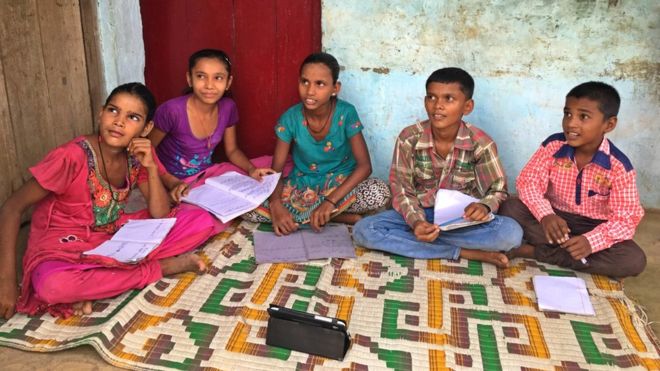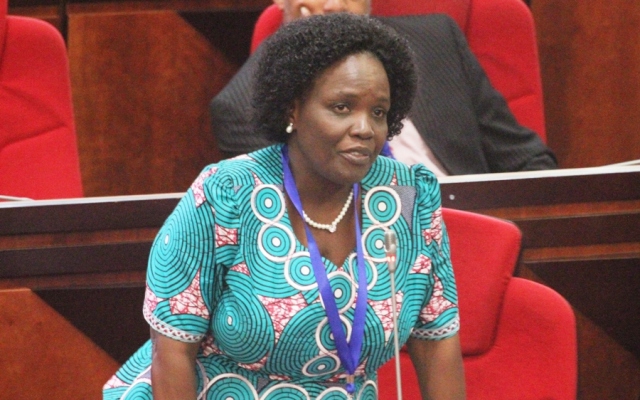Asia/India/Noviembre de 2016/Autora: /Fuente: BBC
RESUMEN: Los niños, sin la guía de los adultos, están formando grupos de aprendizaje y con nada más que una computadora tableta precargada con videos educativos, historias y juegos, están aprendiendo inglés y realizando experimentos científicos. Según los datos de monitoreo del proyecto, en los primeros tres meses de juego con las tabletas, se ha registrado un aumento del 11% en las habilidades académicas básicas de los alumnos, como la lectura en la lengua materna de los niños, la lectura y el habla en inglés y la ciencia. Tal vez incluso más importante, los niños están averiguando cómo navegar por el mundo digital para encontrar respuestas a sus preguntas y son más seguros de hablar.
Children, with no guidance from adults, are forming learning groups and with nothing more than a tablet computer preloaded with educational videos, stories and games, they are learning English and conducting science experiments.
In the first three months of playing with the tablets there has been, according to the project’s monitoring data, an 11% increase in pupils’ core academic skills such as reading in children’s mother tongue, reading and speaking in English, and science.
Maybe even more important, children are figuring out how to navigate the digital world to find out answers to their questions and are more confident about speaking up.
This is a radically different approach to using technology to advance learning.
Quality gap
As with many rural villages in India, most children in Bhaumau go to school but learn relatively little.
India has made major progress in the last decade in enrolling children but deep education inequalities persist, especially in the quality of education.
According to the 2014 Annual Status of Education Report, almost a third of rural children aged six to eight in India cannot even recognise letters yet.
The project in Bhaumau has challenged the idea that teaching is a one-way conversation, in which teachers have all the answers.
It also wants to change how technology is used.
In another nearby primary school, I saw pupils busy in the school’s computer lab trying to draw something with a software package and writing answers to questions in a paper workbook such as «Describe what the tab key does.»
For children who will enter the labour market a full decade from now, it was hard to see the value.
Self-teaching
Will keyboards even exist by the time these children are ready to take on their first job? How will their time in the computer lab prepare them to understand and create information in an increasingly digital world?
The tablet programme in Bhaumau, a village without internet connectivity, stands in sharp contrast to the standard educational practice.
Technology is used as a tool for young people, at their own pace and driven by their own interests, to explore how to get information, answer questions, create content, work with others and while at it have some fun.
Increased ability in reading and other core academic subjects is a by-product, not the central focus of the programme.
If you go for a late afternoon walk through the village you will encounter educational wonders.
Around one dusty lane was a group of three boys, notebooks in hand, huddled together watching a video on the human skeleton.
Body of knowledge
They said they were learning about the 206 bones in the human body, a subject not yet covered in the school they went to in the mornings.
But discussing human anatomy was not their priority. They wanted to conduct an interview, in English, and record it with the tablet’s video function.
You can join the conversation at the BBC’s Family & Education News Facebook page.
More stories from the BBC’s Global education series looking at education from an international perspective, and how to get in touch.
The boys popped up, quickly organising themselves for the task with one boy asking in clear English «How are you?», «Where do you live?», «What is your birthday?»
In another part of the village, a group of three girls and two boys were watching a video of a play.
A few houses away, a third group of children sat with a tablet and one boy was excitedly tinkering with a handmade fan and flashlight.
Cardboard, tape, wires and something taken from the inside of a mobile phone make up his creation.
He fiddled with wires before it got going and proudly displayed it, explaining that he learned how to make one part of it from a video in the tablet computer, but the rest he just invented himself.
Testing ideas
This programme, titled the Hybrid Learning Program, is the brainchild of Madhav Chavan and Rukmini Banerji, the duo who have been for the last two decades at the forefront of Pratham, one of India’s largest non-profit organisations working in the education sector.
The project uses 3,000 tablets without internet connection, through funding provided by Indus Towers and the Vodafone Foundation. Reaching over 26,000 children in 400 villages across Uttar Pradesh, Rajasthan, and Maharashtra, it employs 80 field staff.
We wanted to see what would happen,» says Mr Chavan, who explains that Bhaumau is one of 400 villages where the NGO has dropped off the preloaded tablets.
Long dedicated to improving reading for elementary school students – including pioneering ways to effectively measure rural children’s learning outcomes – Pratham staff are expanding their sights.
Closing the gap in essential academic skills is only one piece of what marginalised children need. To really leapfrog forward, they need the opportunities to develop a much broader set of skills.
Hacking the password
For this programme, they chose villages with a reasonable number of pupils who could read.
They preloaded a wide range of locally relevant content onto the tablets, and only asked for village members to do two things – have children who will organise themselves into groups of five, and have an adult responsible for charging the tablet computers every night.
We made some mistakes in the beginning», says Mr Chavan.
For one thing, the Pratham team was worried that children would use the tablets for playing and having fun rather than focusing on the preloaded educational content.
Therefore, when they first dropped the tablets off, each one had a password that when entered only provided access to the Pratham content.
The Pratham team soon discovered that playing and having fun was exactly the point.
The children quickly found a way to hack the system and bypass the passwords and in no time at all over 50% of all the tablets no longer were password protected.
‘Learning to learn’
Children were doing a wide range of things. They were very interested in Pratham’s educational content and they were also busy making their own – videos, songs, downloads perhaps from visitors’ phones or computers via file sharing.
«We have learned many things,» says Neha Sharma, the programme’s field co-ordinator and the voice on many videos. The most important is to help children develop «learning how to learn» skills.
Digital fluency and academic mastery are important benefits, but secondary to the ability to learn new things, use strategies to tackle a new problem, seek help, find solutions.
Students are so conditioned to have teachers give them the answer that, she says, it is a fundamental shift for them to approach learning in this new way.
The hardest part of implementing the programme has, according to her, been training Pratham staff not to give children the answers or fix problems, but to let children figure things out on their own. A mindset shift not only for the children but also the adults.
Children are, of course, naturally curious, creative and social and when given the tools to unleash these abilities can go far. Perhaps this is what true educational leapfrogging looks like.
Fuente: http://www.bbc.com/news/business-37618901








 Users Today : 157
Users Today : 157 Total Users : 35403805
Total Users : 35403805 Views Today : 187
Views Today : 187 Total views : 3333207
Total views : 3333207